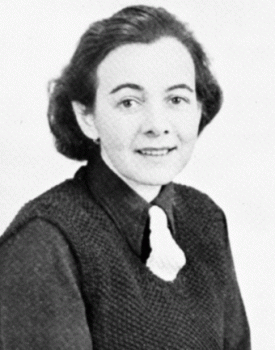Highlighting Swedish Poet Karin Boye Posted by Chelsea B on Mar 10, 2020 in Culture, Swedish Language, Vocabulary
International Women’s Day on March 8 always makes me think about revolutionary women. Writer Karin Boye is on the top of my list of Swedish trailblazers, recognized as one of the most influential contributors to modern Swedish literature. Known for pushing the boundaries, and raising confronting questions of self-discovery, she brought forth many undiscussed narratives and critiques of society in the 1920’s and 30’s. While I’m not the biggest poetry connoisseuse, I do like to use it in my teaching to promote creative and poetic language from my students. Today, I’ll cover a bit of Boye’s background, and highlight one of Boye’s most famous poems, “Ja visst gör det ont / Of Course it Hurts.”
(Psssst, her biography is sort of a bummer. If you’re up for the drama, read on, if you’re more keen on some beautiful poetry, scroll on!)
Karin Boye was born in Göteborg in 1900, and went to school in Uppsala from 1921-1926 where she studied Scandinavian Languages and Literature. Her first collection of poems, Moln / Clouds, was published in 1922 to critical acclaim. She was also involved in a far-left, anti-fascist publication group Klarté, latching onto modernist and surrealist narratives.
She had a brief marriage to fellow Klarté member Leif Björk from 1929-1931, that turned out to be more of a friendship. After their divorce, she wrote the 1932 novel, Kris / Crisis, where she struggles to accept herself as a lesbian woman. She was together with Jewish-German Margot Hanel, whom she met in Berlin, from 1932-1941.
The History of Nordic Women’s Literature acknowledges her contributions to poetry but says “the pinnacle of her writing, […] is Kallocain, 1940, which offers a terrifying vision of the future, of a world destroyed by war between superpowers and atomic weapons.” This piece was inspired by her visits to the Soviet Union and Nazi Germany.
Unfortunately, like many super-talented and sometimes troubled creative minds before her, she committed suicided in 1941. Tragically, her partner Margot also committed suicide shortly afterwards.
Okay, phew! We’ve made through Karin’s really fascinating, yet tragic backstory. Redo för lite poesi? From the 1935 collection För trädets skull / For the Tree’s Sake, is Boye’s “Ja visst gör det ont,” followed by Jenny Nunn’s “Of Course it Hurts,” translation to English, enjoy!
Ja visst gör det ont
Ja visst gör det ont när knoppar brister.
Varför skulle annars våren tveka?
Varför skulle all vår heta längtan
bindas i det frusna bitterbleka?
Höljet var ju knoppen hela vintern.
Vad är det för nytt, som tär och spränger?
Ja visst gör det ont när knoppar brister,
ont för det som växer
och det som stänger.
Ja nog är det svårt när droppar faller.
Skälvande av ängslan tungt de hänger,
klamrar sig vid kvisten, sväller, glider –
tyngden drar dem neråt, hur de klänger.
Svårt att vara oviss, rädd och delad,
svårt att känna djupet dra och kalla,
ändå sitta kvar och bara darra –
svårt att vilja stanna
och vilja falla.
Då, när det är värst och inget hjälper,
Brister som i jubel trädets knoppar.
Då, när ingen rädsla längre håller,
faller i ett glitter kvistens droppar
glömmer att de skrämdes av det nya
glömmer att de ängslades för färden –
känner en sekund sin största trygghet,
vilar i den tillit
som skapar världen.
Of Course It Hurts
Of course it hurts when buds burst.
Otherwise why would spring hesitate?
Why would all our fervent longing
be bound in the frozen bitter haze?
The bud was the casing all winter.
What is this new thing, which consumes and bursts?
Of course it hurts when buds burst,
pain for that which grows
and for that which envelops.
Of course it is hard when drops fall.
Trembling with fear they hang heavy,
clammer on the branch, swell and slide –
the weight pulls them down, how they cling.
Hard to be uncertain, afraid and divided,
hard to feel the deep pulling and calling,
yet sit there and just quiver –
hard to want to stay
and to want to fall.
Then, at the point of agony and when all is beyond help,
the tree’s buds burst as if in jubilation,
then, when fear no longer exists,
the branch’s drops tumble in a shimmer,
forgetting that they were afraid of the new,
forgetting that they were fearful of the journey –
feeling for a second their greatest security,
resting in the trust
that creates the world.
This poem, its translation, and many other works, are available to read on karinboye.se.

Build vocabulary, practice pronunciation, and more with Transparent Language Online. Available anytime, anywhere, on any device.





Comments:
P. Bölin:
Thank you for printing this poem, one of my favourites.
A Swedish/English admirer
P. Bölin
Chelsea B:
@P. Bölin I’m so glad you love this one too 🙂
Liz S:
Jaaa! Tack för det här! Jag måste läsa mer Karin Boye.
Chelsea B:
@Liz S Eller hur? Tänker läsa Kallocain, är du med?!
noel:
Thanks a lot! I discovered a precious gem.
Chelsea B:
@noel Glad to hear it, Noel!
JP:
A beautiful poem. Thanks for posting.
Chelsea B:
@JP Varsågod! They’ll be more poetry to come, stay tuned 🙂